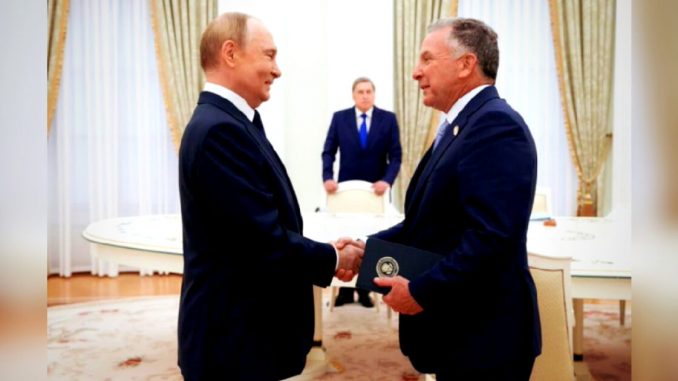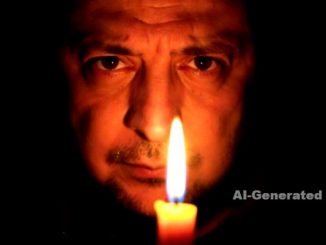
| Published August 7, 2025
Inside the Room: Witkoff’s 3-Hour Kremlin Meeting Signals Rare Diplomatic Opening Between U.S. and Russia
In the gilded halls of the Kremlin, a surprising scene unfolded on Tuesday: U.S. Special Envoy Steve Witkoff, a longtime Trump ally and former real estate developer, sat across from Russian President Vladimir Putin for an intense, three-hour closed-door meeting. Few knew what to expect from the encounter, but the outcome, as revealed by both Washington and Moscow, suggests something rarely seen since the war in Ukraine began—a possible shift in tone.
“Highly productive, great progress made,” former President Donald Trump said afterward, praising Witkoff’s diplomatic performance in unusually glowing terms.
It was a remarkable endorsement for a man with no traditional diplomatic credentials, yet now trusted to navigate one of the most dangerous global standoffs in decades.
A Last-Minute Mission
The meeting came just two days before Trump’s self-imposed deadline: Friday, August 8, when secondary sanctions are set to take effect unless Russia halts its aggressive actions in Ukraine. These sanctions would target not only Russian entities, but also its trading partners—a warning shot to nations like India, China, and Turkey, who continue to engage in commerce with Moscow.
Witkoff’s trip was his fifth visit to Russia in 2025, a testament to his growing importance in Trump’s foreign policy apparatus. Unlike previous administrations that relied on seasoned diplomats and multilateral alliances, Trump has leaned into direct personal envoys—and Witkoff, by all appearances, is delivering.
Signals, Not Settlements
While no public agreements were announced, Kremlin spokesperson Yuri Ushakov called the discussion “useful and constructive,” noting both parties exchanged “signals” about future cooperation, including on Ukraine.
That kind of language—diplomatic but vague—signals willingness without commitment. Still, in a war that has dragged on with brutality and few breakthroughs, it was enough to spark cautious optimism.
Even Ukrainian President Volodymyr Zelenskyy, in a joint call with Trump and European leaders, acknowledged that Moscow appeared “more inclined” toward a ceasefire—though he warned against being deceived.
What Was Said Behind Closed Doors?
The contents of the Witkoff–Putin meeting remain classified, but independent sources suggest the talks may have involved:
-
A possible pause on long-range missile strikes in Ukraine
-
Incentives tied to easing sanctions on Russian agricultural exports
-
A tentative outline for a future Trump–Putin–Zelenskyy summit
Putin’s agreement to host Witkoff in person—and at length—indicates the Kremlin sees the Trump envoy not just as a messenger, but a serious negotiator.
From Real Estate to Realpolitik
Steve Witkoff’s rise from Manhattan developer to frontline negotiator in a geopolitical crisis is, in many ways, emblematic of Trump’s style: unconventional, personality-driven, and aimed at cutting direct deals rather than wading through bureaucracies.
Critics argue this approach lacks the rigor of traditional diplomacy. But supporters point to Witkoff’s access, growing influence, and now, apparent progress.
“This is how you get things done,” Trump said in a social media post following the meeting. “You go to the table, you bring strength, and you don’t blink.”
The World Holds Its Breath
As the Friday deadline looms, all eyes are on Moscow and Washington. If Russia softens its military posture in Ukraine, sanctions could be paused or adjusted. If not, the most severe economic retaliation yet could reshape global trade networks.
Either outcome will be felt far beyond the battlefield—from oil prices in Asia to election rhetoric in Europe to military deployments in the Baltic states.
For now, the meeting stands as a signal—not a solution—that diplomacy may still have a role to play. And that Steve Witkoff, once an unlikely figure on the world stage, now finds himself at the heart of history in the making.
 Implications Of the Witkof-Putin Meeting
Implications Of the Witkof-Putin Meeting
1. Diplomatic Channel Reopened
-
The sheer length and tone of the meeting suggest that the U.S. and Russia may have reopened a serious diplomatic channel—a significant development after months of hardline rhetoric.
-
This may lower the risk of accidental escalation, especially involving NATO borders or nuclear posturing.
2. Pressure on Russia Ahead of Sanctions
-
The meeting was timed just days before Trump’s Friday deadline for a Russian ceasefire.
-
This implies that the U.S. is giving Russia one final off-ramp before enforcing secondary sanctions, which would:
-
Target Russia’s partners (e.g., India, China, Turkey)
-
Disrupt Russia’s access to global markets, energy trade, and shipping insurance
-
-
The economic and diplomatic stakes are escalating significantly, especially if Moscow refuses to yield.
3. Trump’s Strategy: Diplomacy Backed by Threats
-
Trump’s approach reflects a mix of:
-
Direct engagement (Witkoff–Putin talks)
-
High-pressure tactics (tariffs, secondary sanctions)
-
-
This signals a departure from multilateral slow diplomacy and moves toward transactional deal-making with real consequences.
4. New Role for Steve Witkoff
-
Witkoff, a former real estate developer and Trump ally, is not a career diplomat—yet he is now emerging as a central figure in U.S.–Russia relations.
-
His continued presence and access to Putin suggest Moscow is taking his role seriously, which could reposition how U.S. diplomacy is handled under Trump’s leadership.
5. Impact on the War in Ukraine
-
If the meeting produces results (e.g., reduced airstrikes or a freeze in fighting), this may:
-
Buy time for negotiations
-
Reduce civilian casualties
-
Help Ukraine regroup and refortify
-
-
But if it fails, Russia may accelerate attacks before sanctions hit, trying to gain ground or force new terms.
6. Europe Watching Closely
-
Trump claims he briefed European leaders after the meeting—indicating he’s trying to keep allies informed (or onboard).
-
But Europe may be skeptical of a U.S.–Russia bilateral deal that excludes Kyiv or undercuts Ukrainian sovereignty.
-
The EU could be forced to align or push back, depending on what comes next.
7. Markets and Trade Risks
-
Investors and governments will watch closely for:
-
Sanctions fallout (especially if they hit India, China, or Turkey)
-
Oil prices (depending on Russian exports)
-
Energy security in Europe
-
-
If Trump imposes secondary sanctions, it may splinter global trade alliances and force countries to choose sides.
8. Shifting Global Power Dynamics
-
A successful outcome from this meeting would demonstrate Trump’s ability to broker deals unilaterally, potentially reshaping:
-
Post-NATO dynamics
-
U.S.–Russia power balance
-
China’s role as a quiet observer or potential broker
-
 Overall Takeaway:
Overall Takeaway:
SOURCES: THE GATEWAY PUNDIT – US Special Envoy Witkoff Has 3-Hour Meeting With Putin in Moscow (VIDEOS) – UPDATE: TRUMP – Witkoff’s meeting with Putin was ‘highly productive’, ‘great progress’ made
REUTERS – Trump open to meeting Putin over Ukraine as soon as next week, official says
DW – Ukraine updates: Trump to open to meet Putin, Zelenskyy
POLITICO – Witkoff has ‘highly productive’ meeting with Putin ahead of Friday ceasefire deadline





Be the first to comment